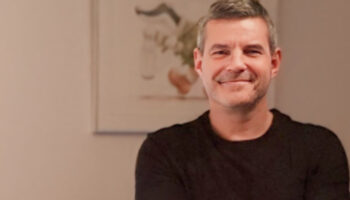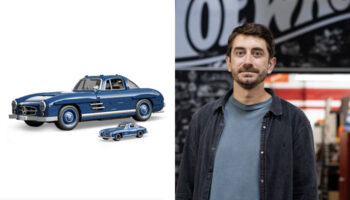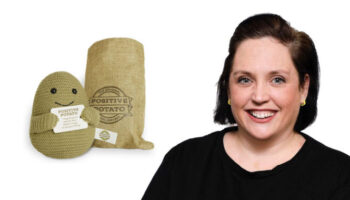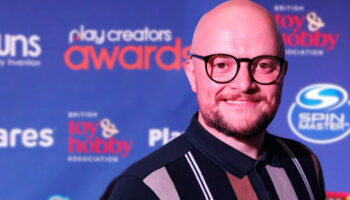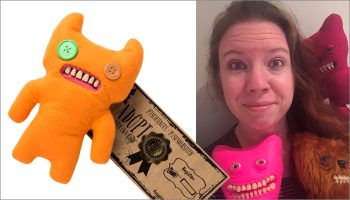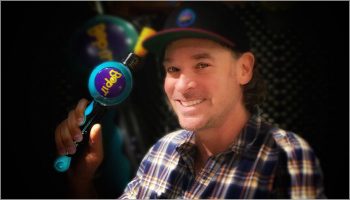Create it, break it, fix it: Phil Tottman and Craig Fearn discuss the powerful process behind Book of Beasties

Thanks for joining me chaps, particularly since it’s an early start! Phil, you’ve been interviewed before at Mojo Nation. We’ve come to know you as the co-founder of Book of Beasties, but for those not in the know, what is that?
Phil: Good question, thank you! So the elevator pitch would be that we’re a growing microcosm of wellbeing games, cartoons, stories and activities that can be used with children in absolutely any setting. I guess we’re most well known for the card games that we develop…
The main one being?
Phil: The main one being the mental-wellness card game which is used in thousands of schools and social care and foster care; numerous different places. That now supports well over 250,000 children.
So a quarter of a million children?
Phil: Yes, since we launched. I’m one of the co-founders along with my wife Nadia. We now lead the company with Craig and our illustrator Anthony, who does all the pretty pictures.
And Craig, we’ve not spoken before. Hello; thank you for joining us…
Craig: My pleasure!

Tell me: what’s your background? How did you come to be involved with this?
Craig: My background is mental wellbeing, from education through to corporate. So I started about 15, may be 20 years ago in this quest to get businesses to take the wellbeing of their staff seriously. So I was the guy who was originally knocking on doors and then being chased down the road by the dogs and the people with pitchforks and everything else.
Ah! Now you’ve said that, I remember you!
Craig: Yes! Yes; you remember the face?!
I remember the dogs! I’m thinking back 20 years and figuring attitudes toward mental health were very different then, so your role would’ve been difficult…
Craig: Yes, it was really difficult back then. But I managed to make two businesses out of it. I worked in education with schools, universities and so on, with students. I’m probably more well known for the corporate strategy side, though.
So how do people introduce you, Craig? How are you referred to?
Craig: I run LightHouse Mentoring; I’m referred to as a sort of sustainable wellbeing expert.
A sustainable wellbeing expert…
Craig: Yes… With the idea being that whatever you put into a company, you should be able to use in the long term. So we don’t do any sticking-plaster solutions; what I’d call “well-washing”, which is quite topical at the moment.
Well-washing being when companies make largely cosmetic changes to mental wellbeing? They create the illusion of improving mental health?
Craig: Right. So we don’t go in and say, “We’re just going to give you a course and then we’re going disappear.” Because we actually want know what it is that’s causing the issue. That way you can better invest your resources and time into sorting that particular issue.
I also work for the Institute of Directors, as their Wellbeing Ambassador. That gives me an awful lot of time to talk to directors of companies; from card games and people that manufacture to people in the service industry; people for whom there’s this huge diversity as well. So that gives me a really great forum to be able to have these conversations.

Great overview, Craig; thank you. Interesting to hear about this notion of “well-washing”… And in terms of Book of Beasties what’s the difference between the new edition of the card game and the original?
Phil: There’s quite a few layers to that. So we obviously identified the need for something that wasn’t just a wellbeing resource because there are already lots out there. But we wanted to really look at how a child learns; how they engage with the things they’re into… What makes them want to use a thing? Or keep using a thing?
And applying that…
Phil: Right. Tapping into that, you realize that’s how children learn. For example, playful education – or playful learning – is growing in popularity at the moment. And you can see why, because it really just engages the child in the topic that it’s trying to address. And so this is kind of what we wanted to do when we first set out: make something to do with mental health, which is a heavy topic, but make it truly appealing – and fun.
Yes. And to that point, Phil, the words ‘educational’ and ‘mental health’ would seem, to a lot of toy and game companies, like the kiss of death. So you’ve got to find a sweet spot between being commercially appealing and beneficial to the user…
Phil: And this is why, when we launched, we had an ambition to go into the Business to Consumer market. But what we wanted to do first was understand the needs – from education onwards. So how would it work in a school, for example? We felt that once we figured that out, we could progress it through to being used in a home environment. Because if it doesn’t work there, then it won’t work here.
Hence the idea for what is, in effect, a home edition?
Phil: Yes, we first titled it the Mental Wellness Card Game because it’s very on the nose, it’s exactly what it is. And we placed it in schools and observed, and we identified the ways the gameplay could be better and how the communication could improve; in the sectors and schools over to social care and foster care… Then into, as you mentioned, the home edition. But then the question: how do we entice that audience?
The parent audience? Because you’re not selling to the child; you’re selling to the adult…
Phil: Exactly. So how do we make it appealing to them? And often that’s about the language that’s used. So when we talk about mental wellbeing, it can often be quite scary. And so we initially called it the Mental Wellness Card Game: Home Edition. That name wasn’t well received!
No…
Phil: So we went back and did some focus groups around the good words to use. And ‘happy’ comes up a lot when we interview the children. So it made sense to call it the Happy Heads Card Game. Then, beyond the title, there’s the simplification of the gameplay as well. Because I think, in a school, it’s very much left to the children to play and the teachers to observe a lot of the time…
Whereas at home we want to encourage the involvement of the parent or the carer as well. So it’s about focusing on that; the improvement of the bond between the adult and the child. So simplifying that gameplay, and making it fit in any kind of family game night without it being too ‘out there’.

Out there?
Phil: Out there in as much as you might want to play this as you would Monopoly, say, or Twister. You don’t want everything to grind to a halt saying: “Now we’ve gotta play this thing about emotions!”
Gawd, no!
Phil: So no, it’s just a game. And it so happens that this topic is interwoven throughout the kind of activities you do within the game. It makes it a much more natural approach, and I think that’s been the biggest difference between the two versions.
And Craig, in terms of achieving that balance and making the difference stick, where does your research and knowledge start to taper into something more commercial?
Craig: For me personally, I think those are the two key words: research and knowledge… Because I do see a lot of projects, but I don’t get involved with many. What I always struggle with is that there’s an awful lot of really good people trying to do really good things, but they’ve just come up with an idea in their basement, and they spark, they create, they’re around for a while – and then they’re not there anymore.
Because the idea doesn’t really work? It doesn’t pan out?
Craig: Right. And people work really, really hard on these ideas – and these ideas are perfectly valid. But someone’s created it based on personal experience or based on what they found worked for their child, or what seemed to work for this, that and the other.
Right. It’s based on their perception of one experience. It’s not grounded in any methodical research…
Craig: Exactly. And the defining differentiator with Book of Beasties was the fact that they take what they think works and they give it to academics and they say, “We think this will work. But go and break it.”

Not “Go and prove it…”
Craig: No; definitely not. Definitely “Go and break it.” Which is the real start of hard-edge research. So when you’re going into hard-edge research, you’re always trying to disprove rather than prove, because then the bias changes. So Beasties gives the work to academics to break, and the academics really work with it. They don’t just sit there and play the game between themselves; they take it to different focus groups – school children, end users; different demographics, different socioeconomic backgrounds.
Real flaw-finding playtesting; proper research.
Craig: So it’s not just, you know, we’re gonna take it here and only here and keep going back to the same children all the time. And then they come back with, “Well, this looked good. This was good. That wasn’t it, though; that really fell on its face.” Anyway, Beasties takes that and refines their product, and they give it back to the academics and they say, “Go break it again!” And this process of break and fix is what really stood out to me about Beasties before I came on board… Because it takes a lot of moxie to put your ideas in front of academics and tell them to break it.
Yes. Because it’s too often thought of as their baby.
Craig: Right. It’s the thing you’ve created from nothing, and you’re putting it in front of people who don’t know you, don’t like you; people who don’t care about you at all…
Alright Craig; easy! Phil’s still on the call… Sorry, Phil – I didn’t know he was gonna turn…
Craig: Ha! No! I mean academics can’t afford to like him, because if they do, it might bias the research.
This is absolutely true. And you used the word ‘moxie’ there, Craig… Ten out of ten; love it. And is cajones is coming up soon?
Craig: Hang on, I’ve got a script… Yeah!
Perfect! But you said something else there that fascinates me because it does take a lot to say, “This is what I have, I want you to break it, then I’ll fix it, then you break it, then I’ll fix it.” But it’s necessary to do that with a commercial game. Is that what you were looking to do with the game, Phil? Were you looking to break it and fix it, break it and fix it?
Phil: Well, there’s always the intention to create a perfect product from the get go. But then I think, with Book of Beasties, it was a necessity. We’re tackling a heavy, important topic, so it needed to work. And it was definitely always the intention to bring in academia, so when Craig and I met, it was the perfect solution because we could do that more rigorously.

And just for context, when did you meet?
Phil: I think… How long ago was that, Craig? It feels like it was just over a year ago…
Craig: Maybe for you. It feels far longer to me!
Ha!
Craig: No! It was June.
Phil: Anyway, I always note that before we made it a game – which we’d never done before – it was about doing the research into developing games. And I bought your and Billy’s book, Deej; right back at the beginning of Beasties, to make sure that I was fully clued up on what to do. And everywhere I looked, I saw big developers saying that the important thing is playtest, playtest, playtest. I can’t overstate that enough.
Quite so! Because that’s where you realize what’s broken. And to Craig’s point earlier, I think the advantage of this is that if YOU’RE the person saying, “I want you to break this”, it does rather sidestep the issue of ego. Because any brutal feedback you get is at your request. So I’ve always felt that’s the most stress-free way to get feedback. Ask, in effect, for possible one-star reviews. So tell me: what’s the biggest challenge you faced in terms of your working together?
Phil: Craig’s just gonna say “Phil”, isn’t he?
Ha! He does seem to have it in for you!
Craig: Ha! No, no, no! Phil, you go first. Then I’ll modify my answer depending on yours!
Phil: Ha! Well, originally the approach the founding team took was play centric; very entertainment centric. We wanted to maximize the enjoyment factor. Then we figured that there’s a massive gap there for the educational and the wellbeing factor. I guess when you’re dealing with academics, people like Craig, you know you’re going to butt heads and discuss sacrificing some elements. But you know what? That’s a challenge; a healthy challenge – so I think the biggest challenge would be merging the impact with the enjoyment factor.
Craig?
Craig: I’d say it’s been going from a sort of fun, card-based, thing – as Phil said, basically around entertainment – and streamlining to work out exactly where we need to go, what we need to do in terms of the research and so on. And then breaking it, because some schools are hammered, every single week by at least 500 products, from people bringing them games, tools and apps.

Oh, jeez!
Craig: And an app seems cost efficient because it can go in lots and lots of different places. But you can’t physically hold an app. It’s not a tactile thing – and not everyone’s got a phone or a laptop. So how do you get those into socioeconomically deprived areas? I knew if we were going to put something in front of a school, we’d need to have a differentiator to everybody else. And that differentiator for us is that we’ve gone through this process and we can absolutely say it works.
And at what point does something like this get taken upstairs, Craig? At what point does improving mental wellbeing become a primary syllabus focus of, say, a government?
Craig: I think this is actually endemic of the wider problem. So I go back to my approach to corporate wellbeing. There’s still really only three rules on corporate wellbeing within the workplace… But what we’ve had for so long is an overworked, underpaid workforce in the teaching industry that’s had edict after edict bestowed upon them from on high by Ofsted, by governments, asking them to do more and more in exactly the same amount of time.
And you’re talking about the UK here, but I’m assuming this is true elsewhere?
Craig: Right. A lot of the time you spend in school, you’re learning to regurgitate facts rather than actually learning to be a child. We put children through SATS, say; through exams… We measure 11-year-olds on their ability to do maths and English against a national standard. But if you think about it, that standard is actually there to measure the teachers rather than the students.
So we want children to be to be able to say that the Battle of Hastings was in 1066, but we don’t seem to want to see them grow the emotional intelligence to know that you don’t shout at your peers; you don’t say something rude in public. So how do you fulfill that need without having a resource to enable you to fulfill that need? For me, this is where Beasties has really come into its own.
How so?
Craig: In that if you’ve got a copy of Beasties in the classroom or whatever, you know, it’s kosher; you know, it’s real, you know, it does what it needs to do. So you’re not afraid to use it. You’re not afraid to put it out there in case Ofsted come along and say, “Hang on a minute. What are you using that for?”
In fact, Beasties, the school edition, comes with Ofsted-compliant lesson plans. So you can actually use it as part of that interjection. And again, it’s the whole process that I use with everything: identify the problem, find a solution, break the solution, find a solution to the broken solution, break the solution, keep going, keep going, keep going.

I’m curious, Craig – in terms of mental wellbeing, how did the pandemic impact children?
Craig: The school children that went through the pandemic years? The statistics are all over the place there… So many children are facing some form of mental-wellbeing issue because they weren’t able to get out with their peers. What have they lost in terms of their social-interaction skills? Who knows! Maybe they didn’t have a brother or sister at home, and had no one else at their own age to interact with…
Plus, if they came from a socioeconomically deprived background, they didn’t have a laptop to get on and talk to X, Y, and Z. And if you’re in a minority group of any kind, where are your peers? Who are you talking to? Where are you getting support? So these children are now moving up through our educational system with this gap that’s come about. Obviously, some of that was already there before the pandemic – but post pandemic, it’s really something.
Gosh, I can only imagine. And I was taken with something you said there too because I’ve long held the view that we’d all be a lot better off teaching emotional intelligence at an early age rather than ‘1066 and all that’… Because learning about basic psychological needs, and emotional needs – and how to meet them in a healthy way – would seem to be much more important than many of the things we see on the syllabus. And yet very few schools seem to recognise that…
Craig: Yes. Again, this – for me – is a wider issue than just our school sector. We again go into the wellbeing in the workplace and we’re very much in that old style… You turn up, we own you until five o’clock, and then you go home. That type of thing. And, you know, you speak to people all over the country who run businesses and it’s like, “Well, I’m not the health service! My job is not to emotionally cajole individuals through the workplace.”
Which isn’t wrong!
Craig: No; that’s a perfectly acceptable argument. They’re a business; they’re there to earn money. And the school system we have is very much set up to churn out people who fit THAT mold. So, effectively, you come through these little production centres and it’s about making you productive and moving you into an economy and a sort of capitalist-based society… To better force through that capitalist agenda. How are you going to contribute to that agenda? What we need is people who are going come in, do X,Y or Z, then go home.
So very much when from the very beginning where we’re measuring maths, English, science – whatever – it might be from kids who are coming out of playschool… And you’re coming through on all these things. Now, there are institutions that have decided to change and look in different ways; places like forest schools and Steiner schools and things on those sorts of lines that advocate being a kid or playing over academic achievement right – until they move into secondary school.
And of course, there’s always going to be this trade off because you’ve only got a finite number of hours at school. So if you’re saying to a teacher with 40 kids in their class, “You’ve got to teach all these kids about emotional intelligence. Oh, and by the way, they need to know this, this, this and this… And we’re gonna send somebody into your school once every four years who can just dump all this stuff on top of you and ruin your entire career!”

Ha! It feels that way.
Craig: This sort of moves into the Happy Heads edition of Beasties as well, because when I came on board and we started to emphasize this break it, fix it, break it, fix it approach, it was to identify the need. With the school edition, the need is relatively obvious. It’s within the school system… This is how we can help. But as teachers have always pointed out, they’re not parents.. We’ve all heard the line, “We’re not a parent substitute. We’re here to teach things.” So you then get into this question: whose responsibility is it to teach these soft skills?
Now, if you go down the educational route, educators will say it’s the family’s responsibility to teach these skills. But of course, we’ve got families now who don’t have any time because they’re working, they’re meeting the other needs of their children, their house, their mortgages… All sorts of challenges. And often both parents then go into work, which meets the amount of time they get to actually interact with their children to impart this knowledge has been reduced as well.
And that presumes they have the knowledge to impart…
Craig: Another problem in itself; absolutely. So you’ve got this double whammy on kids where the educational system is “educating” in a certain way, because that’s the way it’s set up. And then home has changed to the way it was. And it’s not just here in the UK. It’s in other countries too. And effectively, this is why this is the next obvious stage for the Happy Heads. Because what we then intended to do with it was say, “Okay, you’re doing X in school, but how can we meet the needs of the overstretched family unit? And what can we do to make them want to do this?”
We also don’t want to be preaching to parents or teachers, of course, because we understand everyone’s under huge pressure, and that they’re doing their best. And no one should, you know, be pointing a finger here. We don’t want to be saying, “If you don’t play our game, you’re a terrible person.”
Oh, I don’t know; it’d make an interesting commercial!
Phil: Ha! Yeah, good sizzle!
Craig: Ha! And that’s where Happy Heads was birthed, with the intention of reconnecting the family unit; reconnecting to allow, and again, you know, Phil talked about it earlier on. I can remember when I was a kid every Friday night, we played Monopoly, and my dad would be there, my mum, my brother… Although, you know, we wouldn’t really play Monopoly. We’d play ‘Who Can Cheat the Best?’, but, you know, that’s how everyone plays Monopoly, isn’t it?
Ha! I can’t confess; I never did! Played a very honest game…
Craig: You never, bought an extra set so you can your own Get Out of Jail Free cards?

I feel like we’re learning a lot about you here, Craig, I really do…
Craig: Well, anyway, the point was that that’s when we communicated; that’s when we talked about the issues. That’s because it flowed because you were in that place. You were in that zone. You were connected to your family. Mobile phones weren’t a thing, we didn’t have a TV on all the time. And you know, that’s the great thing about the Happy Heads game: it’s reconnecting those family units… It’s designed to engage the adults with the children as well as the children with the adults.
Lovely!
Craig: Sorry, I’ve been wittering on…
No, not at all. It was a very insightful answer… A bit depressing at times, but insightful!
Craig: This is why people don’t invite me to much.
Phil: There was an element I wanted to clarify, though, because obviously we work with lots of schools and individuals within an educational setting. But it’s not about the individuals whatsoever. It’s obviously a systemic concern rather than individuals within the facilities. There are people in there that are really fighting the good fight to do exactly what’s best for the child. And it’s these people that we’ve connected with and learned from…
That’s where we’ve received a lot of that information, which we’ve then taken through to the Happy Heads card games, that family focused one, because a lot of these people are family members as well. And once they get to know, they become Book of Beastie champions… So this is where we gather in that initial information. So we were talking about the education system very in a very blanket way there, but there are people in there that are absolute heroes.
I absolutely agree with you. And I think it’s true of our National Health Service as well. I think there are almost exclusively great, empathic, caring people working really hard at the front line… Every time I’ve ever spoken to a doctor or a nurse, they’re absolutely doing their best for me in that moment. And yet, you take a couple of steps back from the front line and you think, “What the hell is wrong with this organisation?” Because the politics, the admin and the communication let down those people. And I think it’s exactly the same with our schools. But anyway! Look… Gosh, we started out talking about a card game and it’s turned into a very deep conversation that, you know, nobody’s ever going to read…
Craig & Phil: Ha!
…but if, if they did, what a treat; they won’t know what they’re missing! Let’s get it back on track. Phil, what’s next for Beasties?
Phil: Well, Happy Heads is family focussed, so Business to Consumer is our next step. We feel we’ve achieved the right amount to be able to go out into families and create something that goes out there and stays out there, rather than having our kind of aftercare services that we provide to the professional side. So that’s going to be a huge focus for us.
We also have a lot of other things in the pipeline; stuff we alluded to last time we spoke to you guys. Some of that we’ve already sent out to be tested and broken; that’s been done and we’re fixing it.
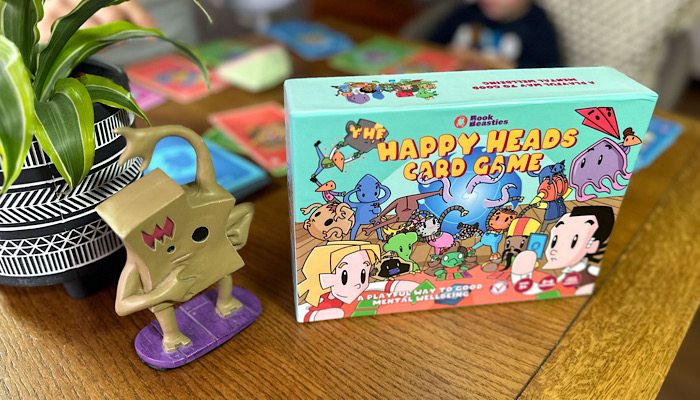
Adam Butler will make sure there’s a link to that article when I say “here”. And Craig?
Craig: I don’t wanna give too much away! It’s all very much on the drawing board at the moment. We don’t want to put anything out there until we’ve broken it, fixed it, broken it, fixed it. The other big one is America, though. We’re just starting to tie up some distributor deals in the States. We also have plans to look towards Europe and Asia. Ultimately Beasties is engaging so many different stakeholders in so many different places. All of a sudden, people are starting to realize this is a really important thing, and starting to look for something that’s not a gimmick.
Phil: The other thing to highlight is some of the relationships we’re building – not just with customers and clients. We also have people asking us to create resources for them. Our approach to this, using our development methods, is to create small universes with characters; this whole kind of microcosm… These little experiences for children and young people to engage with and benefit from that.
And, out of interest, can you say who those people are? Purely for example? We’ve just started working with the likes of the Metropolitan Police, Brentford Football Club, Tottenham Hotspur, so getting into the Premier League there! These big organizations are recognizing the importance of supporting the youth they work with. So it’s about nurturing that, and making more people aware of what we’re bringing to the table and how we make a difference.
Brilliant. Let’s wrap this up with some sensible admin! Phil, if people think they can help, or want to find out more, what’s the best way to reach out to you guys?
Phil: Through the contact form on the website is great; bookofbeasties.com. We’re always happy to chat.
Well, listen, gents, mental health is always a – well, mental wellbeing we’re being encouraged to say, aren’t we? As if that’s not just another wrong tree up which to bark… In any case, mental wellbeing is always a fascinating area for me to explore, so thank you for joining me. Fantastic chat.
–
To stay in the loop with the latest news, interviews and features from the world of toy and game design, sign up to our weekly newsletter here


